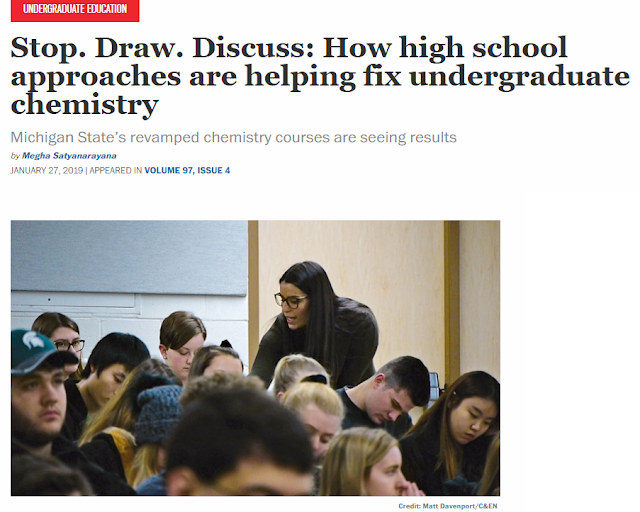We Need to Pay Attention to Details
When something involves several factors, we need to be careful in drawing conclusions. In the physical sciences, experiments are designed to focus on one factor at a time while controlling others when the object of the investigation is multivariate. Basic education is an example of a complex system. For this reason, before we declare that we have found a silver bullet, we need to pay attention to details. Megha Satyanarayana wrote recently an article in the Chemical and Engineering News that shared an apparent successful innovation in chemistry undergraduate education at the Michigan State University. In "Stop. Draw. Discuss: How high school approaches are helping fix undergraduate chemistry", the following comments from a 20-year old student are highlighted:
Helping students to become more engaged with what is being covered inside the classroom is important. Allowing students to discuss with each other what they are currently trying to learn should be helpful. No one can argue against active learning after all. The article even adds that what students are doing inside the classroom at Michigan State University is similar to the way scientists and engineers actually do their work. They talk and consult with each other. But this is where an important detail may be missed. When scientists ask for help, they normally try to ask the right people. Scientists are trained to review published literature. Scientists seek views from those who have experience. And the classroom inside Michigan State University is perhaps no different as the article briefly mentions in one sentence, "Teaching assistants, who are advanced undergraduates and graduate students, pace the aisles, answering questions and guiding discussion." Simply engaging the students may not be the only factor. In this case, having competent teaching assistants may actually be the key. Of course, this is no secret especially when the class is composed of hundreds of students. Contact time with the main professor is going to be very much limited that teaching assistants start to play a significant role.
Student engagement is a worthy goal. Engagement needs to be genuine and John Wink reminds us that true engagement is not simply making students busy for it needs to be measured by how much knowledge students are actually retaining in "The Key to Unlocking Student Engagement". But even here, an important detail is necessary: Students must be retaining the correct information. In "Active Learning Not Associated with Student Learning in a Random Sample of College Biology Courses", published in the CBE - Life Sciences Education, it is demonstrated that student engagement is not guaranteed to bring better learning outcomes. We are specifically reminded:
“It was interactive. We could talk to the people sitting next to us. It’s not like learning facts. It’s more like common sense, or reasoning,”
 |
| Above copied from C&EN |
Helping students to become more engaged with what is being covered inside the classroom is important. Allowing students to discuss with each other what they are currently trying to learn should be helpful. No one can argue against active learning after all. The article even adds that what students are doing inside the classroom at Michigan State University is similar to the way scientists and engineers actually do their work. They talk and consult with each other. But this is where an important detail may be missed. When scientists ask for help, they normally try to ask the right people. Scientists are trained to review published literature. Scientists seek views from those who have experience. And the classroom inside Michigan State University is perhaps no different as the article briefly mentions in one sentence, "Teaching assistants, who are advanced undergraduates and graduate students, pace the aisles, answering questions and guiding discussion." Simply engaging the students may not be the only factor. In this case, having competent teaching assistants may actually be the key. Of course, this is no secret especially when the class is composed of hundreds of students. Contact time with the main professor is going to be very much limited that teaching assistants start to play a significant role.
Student engagement is a worthy goal. Engagement needs to be genuine and John Wink reminds us that true engagement is not simply making students busy for it needs to be measured by how much knowledge students are actually retaining in "The Key to Unlocking Student Engagement". But even here, an important detail is necessary: Students must be retaining the correct information. In "Active Learning Not Associated with Student Learning in a Random Sample of College Biology Courses", published in the CBE - Life Sciences Education, it is demonstrated that student engagement is not guaranteed to bring better learning outcomes. We are specifically reminded:
"...constructivist theory argues that we can expect students to retain serious misconceptions if instruction is not specifically designed to elicit and address the prior knowledge students bring to class..., students with preexisting ideas that impede learning and that are unlikely to change without instruction designed specifically for that purpose."Herein lies again the important ingredient of having someone who knows be a part of that engaging discussion.
Comments
Post a Comment